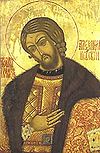- Nikolai Pokrovsky
-
Nikolai Nikolayevich Pokrovsky (Russian: Николай Николаевич Покровский) (27 January 1865, St Petersburg – 12 December 1930, Kaunas) was a Russian politician and the last foreign minister of the Russian Empire.
Pokrovsky attended the law schools of the Moscow State University and St Petersburg University. In 1889, he began his career at the Ministry of Finance. In 1902-1903, Pokrovsky was a deputy chairman (chairman from 1904) of the Department of Taxation of the Ministry of Finance. In 1906, he was appointed deputy finance minister and mainly oversaw taxation affairs. In 1914-1916, Pokrovsky was a member of the State Council (retaining his post of the deputy finance minister until July 1914). From January to November 1916, Pokrovsky held the post of state inspector. On 30 November 1916, he was appointed minister of foreign affairs. Some of the English newspapers regarded his nomination as a sign of final suppression of Germanophilic agitation in Russia. On 19 November 1916, Pokrovsky announced in the State Duma that the treaty of 1915 with Great Britain and France (later signed by Italy, as well) had finally established Russia’s right on the straits and Constantinople. Also, he said that Russia would never sign a peace treaty with Germany, which caused a storm of applause in the Duma. During his 3-month tenure as a foreign minister, Nikolai Pokrovsky announced his resignation four times over disagreements with the minister of the interior Alexander Protopopov. Pokrovsky favored the attraction of the American financial capital into the Russian economy. With the support of the Ministry of Finance, he proposed to send a special commission on economic and financial affairs to the United States. In January 1917, Pokrovsky prepared a document, in which he defended the idea of establishing close ties with the US in light of this country’s potentially decisive role in ending the war. In his note to the tsar from 21 February Pokrovsky expressed his confidence in victory over Germany and inquired about a possibility to prepare an expeditionary force for deployment in Constantinople by October 1917. During a session of the Council of Ministers on 25 February 1917, Pokrovsky proposed the resignation of the whole government. He was sent to negotiate this matter with the State Duma and Progressive Bloc. On 26 February Pokrovsky reported about his negotiations with the Bloc (led by Vasili Maklakov) at the session of the Council of Ministers in the Mariinsky Palace. The Bloc spoke for the resignation of the government.
After the February Revolution, Pokrovsky headed the Russo-American Committee on Assistance to the Economic Rapprochement between Russia and the US. After the October Revolution, Pokrovsky emigrated from Russia and taught at the Vytautas Magnus University.
Preceded by
Boris StürmerForeign Minister of Russia
1916–1917Succeeded by
Pavel MiliukovPeople from Russia Leaders and religious - Pre-1168
- 1168–1917
- 1922–1991
- 1991–present
- RSFSR leaders
- General secretaries
- Soviet premiers (1st deputies)
- Soviet heads of state (and their spouses)
- Prime ministers (1st deputies)
- Foreign ministers
- Prosecutors general
- Metropolitans and patriarchs
- Saints

Military and explorers - Field marshals
- Soviet marshals
- Admirals
- Aviators
- Cosmonauts
Scientists and inventors - Aerospace engineers
- Astronomers and astrophysicists
- Biologists
- Chemists
- Earth scientists
- Electrical engineers
- IT developers
- Linguists and philologists
- Mathematicians
- Naval engineers
- Physicians and psychologists
- Physicists
- Weaponry makers
Artists and writers Sportspeople Chess playersCategories:- 1865 births
- 1930 deaths
- Members of the State Council of the Russian Empire
- Foreign Ministers of Russia
- Imperial Russian politicians
- Moscow State University alumni
Wikimedia Foundation. 2010.

